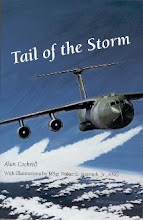The holiday season is always tense for airline pilots. Even the super-senior ones can’t get it all. You want Christmas Eve off, and the big day, too. And you want the day after off so you won’t have to commute in that night. Ditto for New Year’s Eve, Day and after. In my case I’ve got my wife’s birthday to on New Year’s Day to consider, and every other year the Christmas reunion her family holds. Then there are the parties, plays, concerts and services that come with the season. No way you can’t work them all in. You’ve got to prioritize. You’re bidding power only goes so far. I’m tired of it and can’t wait till next year when I’m finally a normal person and can do it all. This final year on the line was no different. I schemed as usual to try and salvage a day, morning or afternoon at home sometime near Christmas. And I thought I had done it.
What a perfect plan I had. My plotting to get Christmas
day off went off without a hitch, or at least that’s what I was thinking. I was
supposed to be on reserve (of course) but I got to studying the open flying
coming up and looked at the reserve availability. Someone had just called in
sick for Buenos Aires. The trip technically worked on Christmas day, but it got
back into base at 0600 Christmas day. I was not eligible for it because I was
coming up on two days off. But then, no one on the list was eligible either. Hmmm.
Could there be opportunity here?
I devised my scheme and called the scheduler, telling
him, “I see you’re in a pickle about Buenos Aires tomorrow night.” He confirmed
it, saying he was going to have to draft someone and move their days off. I
told him, “Look no farther.” He moved my Monday day-off to Thursday and put me
on the trip.
Good work. My family and some extended family were planning on
Christmas dinner. I’d be home by 10am. An extra perk with the deal was the opportunity
to do some Christmas shopping in BA. I hung up the call to the scheduler smirking
like schoolboy who had just put a frog in the teacher’s purse. I told my wife I’d
be joining them, with the usual caveat an airline pilot’s wife is so painfully
accustomed to: assuming all goes well.
Next evening when I met my crew, Rich, the relief pilot told
me he had worked out the exact same deal with the crew desk. We high-fived it
and pored over the paperwork. Good weather. Clean airplane. No delays expected.
If a song bird had flew in and lit on my shoulder I wouldn’t have been
surprised.
While we were settling in on the flight deck something
subtly ominous happened. A mechanic poked his head in and asked, “Is that right
fuel pump low pressure light on?”
We looked at each other, eyebrows wrinkled. "That's strange," I said, “I
don't remember seeing a write-up about that when we went over the paper work
back in ops. Did you?” They both shook their heads. Rich grabbed the flight
paperwork and reviewed the last two weeks of maintenance work. There was no record of it. Why then, did the mechanic come up and ask
such a question? We shrugged it off and went about our business of prepping the
cockpit for the long, dark trek south.
At 2050 hours I
pushed the “READY” button on the ACARS panel, 10 minutes before scheduled push
time. This told station operations center that we had completed our pre-start
checklists, had our fuel sheet and maintenance release, and were ready to go. We got the plane ready early and I visited with some of the
passengers. They were upbeat and happy—headed home for Christmas, or to visit. I
went back to the flight deck to start the checklists.
When push time came and
went and the cargo doors were showing open, we figured they were just late as
usual, loading bags. No big deal. But then, why was the entrance door still
open? That answer literally walked in the door as I was about to call station
ops to ask it. The agent said three people were denied boarding because they
didn’t pay their “reciprocity fees.” The fee is $160. You pay on-line before
you go and you must show the receipt at the boarding gate. It’s called reciprocity because it is a tax war
between the two countries. I don’t know who started it.
The problem was these three folks’ checked bags had been
loaded with the other hundreds. Now we were in for at least an hour’s delay
while the bag crews unloaded, sorted and re-loaded. We sipped coffee and sank
back into our seats. An hour didn’t threaten out crew duty day much, and an
hour robbed from a 36 hour layover was no big deal.
After about 45 minutes, Rich, sitting on his jumpseat
said, pointing at the EICAS, “Look! That light is on!” As quickly as my eyes
found it, the RT CTR FUEL LOW light went off. We looked at each other. Jeff,
the first officer said, “I think that’s why that mechanic came up earlier. He
might have seen that light come on when he was riding safety brakeman. They
towed it from the hangar, didn’t they?”
I shrugged. I didn’t know whether they towed it over or
not. If we didn’t see it come in under tow, we usually don’t know. About then
the agent came back up and said they had found the bags to be off-loaded and
were re-stowing the rest. It wouldn’t be long now.
Nobody said much for a few minutes, but I knew we were
all searching our thoughts about that peek-a-boo light. We had our carefully laid
plans. The passengers were eager. We wanted to go. It was easy to ignore a
light that appeared a few seconds every now and then, especially when you know
that even if you have a defective center tank pump, you still have a second one
that can do the job of both.
We heard a thump, and knew it was the forward cargo door
sealing itself closed. The cargo door light went out. The agent appeared with a
big smile. “They’re finished down below. Can we pull the bridge and get you out
of here?”
“Wait,” I said. I looked at the other two guys. I saw
trouble in their faces. I wasn’t feeling too gung ho myself. I had no doubt we
could safely make that flight with the redundancy we had. If that light came on
after 100 knots on the take-off roll we would not stop. On to BA. If the second
center pump failed enroute (what are the chances of that?) trapping fuel in the
belly tank, then we would have to make a refueling stop somewhere. Not good. We
would likely go illegal on crew duty day and would dump about 200 people on some
sleepy Caribbean town. BTW, at out stations guess who is responsible taking
care of stranded passengers?
Another scenario: If the light came on prior to 100 knots
on the takeoff roll we would have to abort. There would be a long
trouble-shooting process. With an 11 hour flight ahead, we would certainly run
afoul of the duty rules and go illegal.
With the agent waiting, the passengers settled, the push
tug connected and the ground crew giving me the all clear below to push, I had
a decision to make and the ramifications could shatter a lot of Christmas
plans, not just mine.
“As
the hours pass … ties are pulled down and collars loosened; there is a much
stretching of limbs. It is at this point that some airmen become preoccupied
with personal thoughts, their dreams transporting them over the horizon to more
prosaic scenery. They create romantic visions of their homes in which their
wives are continuously delightful, their children never cry, and all the bills are
paid. Sometimes they become so sentimental they even trifle with thoughts of
remaining permanently earth-bound. Only the cynics know this is next to
impossible.”
Ernest Gann
Fate is the Hunter




